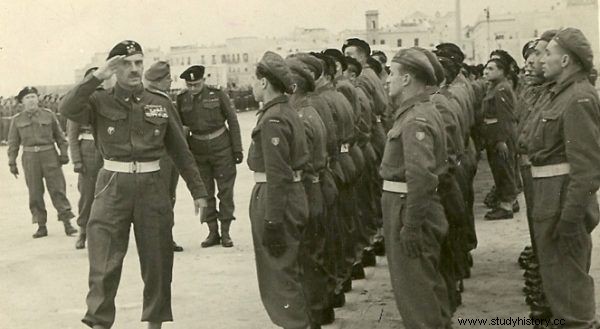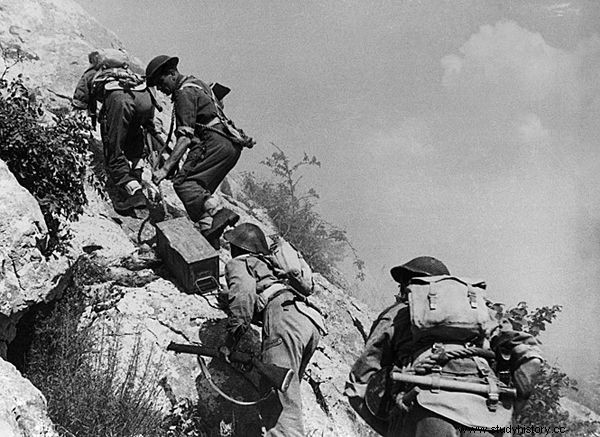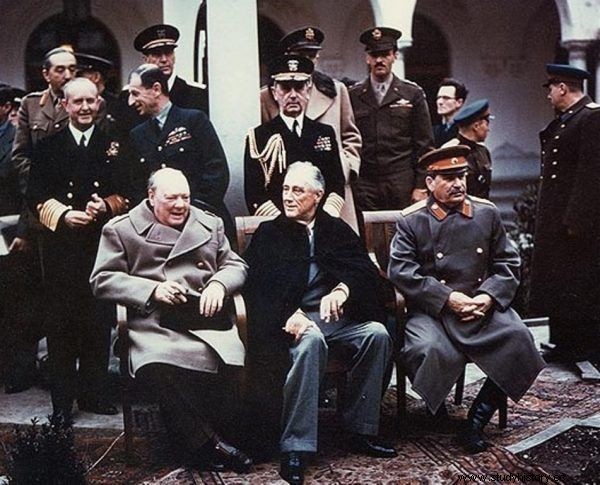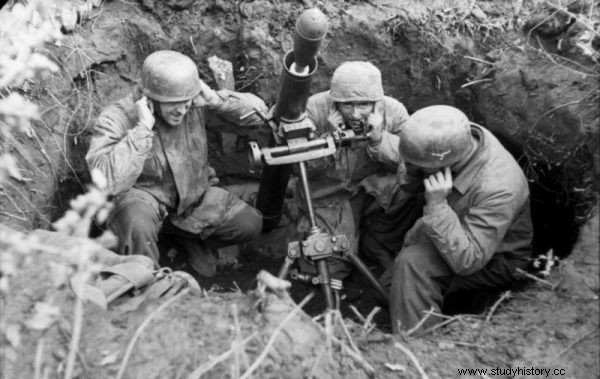The courage of its soldiers has gone down in history. The conquest of the monastery at Monte Cassino, as well as the subsequent fights in Ancona and Bologna made the Polish soldier famous all over the world. But was it not so that we shed our blood in vain for the benefit of others? And didn't the Polish sacrifice make Stalin's conquest of our country easier?
The hill of Monte Cassino was an integral part of the Gustav Line, on which the German 10th Army was defending itself, blocking the Allied road to Rome. The breakthrough of the German fortifications was made by the French Expeditionary Force and, fearing encirclement, the Germans had to withdraw. The losses among Poles were enormous - almost 10% of the corps, i.e. 4,075 soldiers, including 932 killed. Further fights were also bloody, in total in Italy the corps lost 11,379 soldiers, including 2,301 killed (read more about it in our other article) .
A big problem for the Allied command was the issue of supplementing Polish divisions. After all, there was no population base from which to recruit new soldiers. General Anders reassured his superiors that he would find new subordinates ... at the front. He hoped that a large part of the Poles conscripted into the Wehrmacht would willingly join his army. Just like all kinds of Polish POWs and prisoners. He was not disappointed in this matter, and general Anders owes his liberation and allowing them to remain in the West. But what about the ruthless battles in which he often sent the same soldiers to death?
In the light of subsequent events, it can be assumed that the sacrifice of the Polish II Corps was in vain. Anders is accused of senseless destruction of the army in the fight for the interests of the allies, who finally betrayed us and left us to Stalin. It is far too easy, however, to put the Anders Army's efforts in retrospect. Instead, it is appropriate to look at the international situation that prevailed in 1943 and beyond. So this context in which Anders actually operated.

Is it possible to recruit soldiers at the front? General Anders believed so.
What are we fighting for?
The Polish government-in-exile was in a difficult situation in 1944. Stalin used the discovery by the Germans of the graves of the victims of the Katyn massacre in April 1943 to break diplomatic relations. At the same time, he began to lay the foundations for the self-obedient authorities of Polish communists. Polish troops dependent on the Kremlin and fighting as part of the Red Army were also formed. The first of these formations was the Infantry Division. Tadeusz Kościuszko, later transformed into the 1st Polish Corps in the USSR.
Meanwhile, General Anders' Army, which was subordinate to the government in London, was accused by Soviet propaganda of inaction and reluctance to fight. Of course, the emaciated and exhausted soldiers who had been pulled out of Soviet labor camps had to be fed, trained and equipped. Due to the obstacles set by Stalin himself, a decision was made to transfer the II Corps to the Middle East, where its proper formation had only just begun. Gen. Anders and his soldiers wanted to prove that they were willing and able to fight for the common cause and for Poland. But not shoulder to shoulder with the Red Army, which they considered an enemy, but under British command.

On the other hand, in 1943 there was a conference in Tehran. It was decided, inter alia, that the post-war eastern border of Poland will be roughly the Curzon Line. This meant that the entire east of the Republic would fall to the USSR. Of course, these decisions were not made public, although the government in London suspected that the outcome of the Big Three was not successful for Poland.
Therefore, General Anders, despite the fact that he was aware of the difficulties of the task, argued his decision to use the 2nd Corps in the attack on the monastery on the grounds that the troops in another section would also suffer severe losses, and the capture of the world-famous fortress could help the cause Polish. The Commander-in-Chief, General Sosnkowski, was against this decision and predicted the attack would fail.
Unthinkable
As you know, the political situation did not allow Poland to be saved. The country was "liberated" by the Red Army, and Stalin did not intend to keep any promises. The Commonwealth found itself in the Soviet sphere of influence. General Anders' soldiers, however, did not know exactly what the situation was. They wanted to prove to the Allies and to the whole world that the Poles are devoutly fighting Hitler, hoping that it would be some kind of bargaining chip. And that the decisions that have long determined the fate of the country can still be reversed. In a sense, real politics has been contrasted with arguments of honor. It just couldn't work.

Was the effort of the Poles at Monte Cassino in vain?
The bargaining chip has not been used at all. If, after the success of the conquest of Monte Cassino, the commanders of the II Corps refused to participate in another offensive, perhaps it would become at least a little effective method of putting pressure on the Allies. Perhaps any concessions could be obtained. Today we can only guess, because the attempt has not been made - neither in Italy, nor on other fronts. It should be emphasized, however, that after the arrangements made at the Yalta conference in 1945, where the Curzon Line was officially adopted as the basis of Poland's eastern border, there was almost a revolt in the 2nd Corps, and the soldiers actually refused to continue fighting.
General Anders himself said that he is no longer able to give his people a clear answer what they are fighting for. The almost desperate requests of military superiors to remain on the Italian front prompted him to continue fighting. He also tried to win as much as possible for the Polish cause, and to keep the existence of an independent Polish army as long as possible. In talks with Churchill, he even suggested that after defeating Hitler, Russia would become an enemy.
At the end of the war, the British considered for a moment the operation of the military displacement of the Red Army from Eastern Europe. The project was titled "Unthinkable" with a very telling name. If the operation were actually carried out, the Polish army would not only have a raison d'être, but also a chance to return to a free homeland. The British, however, came to the conclusion that it was not profitable for them to start World War III. General Anders won the only thing he could for his soldiers - the possibility of staying in the West. For most of them, a return to Poland would, at best, mean a prison sentence or an exile. At worst:show trial and execution.

The big three arrangements at the Yalta Conference sparked a rebellion in the ranks of the 2nd Corps.
Losses
There is also the question of the large losses suffered by the 2nd Polish Corps both in the battles for Monte Cassino and later. First of all, it should be realized that the fighting for the Gustav Line, of which the fortified monastery was a part, was extremely bloody for all the forces involved. Earlier attacks by New Zealand, American and Indian troops had cost comparable losses.
Moreover, the Polish divisions were weaker, because at that time they consisted of two brigades, not three. Polish soldiers also opposed one of the elite forces of the Wehrmacht, whose training was superior to all Allied forces. Finally, Polish soldiers were extremely brave, but the training of - especially middle-level officers - left a lot to be desired. It should also be taken into account that the theater of military operations was extremely difficult and favored fierce position fights, and these always generate greater losses than the maneuver war. An important reason was also the poor command of the Allies - especially during the Battle of Monte Cassino.

In the battle of Monte Cassino, the Poles had to compete with the most elite German units. The photo shows German parachute shooters.
Finally, it is necessary to write about one more important point, which is often forgotten in a dry analysis of the facts. Polish soldiers from the 2nd Corps almost gasped with vengeance and wanted to fight the Germans at all costs. Many soldiers in the British Eighth Army saw their determination quite understandable. As Glyn Harper and John Tonkin-Cove write in the book “Monte Cassino. A new look, an unnecessary battle? ”:
Such an attitude often alienated their comrades from the 8th Army against Poles. Conversely, a certain nonchalance and free attitude of the British angered many Poles. Fred Majdalany, officer of the Lancaser Fusilier and the historian of the battles of Monte Cassino, recalled that the Poles "thought that we were taking everything too lightly, because we did not breathe our wild hatred all the time".
In the end, the heroism of the Polish soldiers and their sacrifice of blood were wasted. Perhaps in 1944 General Anders should have already realized that Poland was lost and that his efforts would not bring any results. However, it is difficult to condemn him unequivocally for the fact that he wanted to use subordinate troops in such a way as to publicize the Polish issue as effectively as possible and to belie the Soviet propaganda. It should also be remembered that the actions of the Polish II Corps, as well as of all Polish soldiers fighting on the fronts of World War II, contributed to its faster end. For the benefit of hundreds of millions of people.

